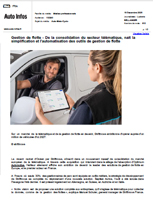Manufacturers and telematics providers: partners or rivals in the data race?
While embedded telematics is gradually becoming a standard in fleet management, a central question arises: are car manufacturers, which are increasingly present in this field, competing head-on with telematics specialists, or are they part of a logic of complementarity? A look back at the challenges and perspectives of a rapidly changing sector.
Telematics: from the option to the management reflex
Formerly seen as an intrusive surveillance tool, the embedded telematics has now become a An essential lever for the management of car fleets. It makes it possible to obtain valuable data on the real use of vehicles: mileage, consumption, driving behavior, geolocation, mechanical diagnostics, etc.
The numbers bear witness to this rise in power:
- En 2021, France counted 1.1 million connected vehicles, i.e. an increase of 5% compared to 2020.
- En Europe, Berg Insight is planning a penetration rate of 34.5% by 2025, representing 22.5 million connected vehicles.
- Horizon 2030 : close to 70% of new vehicles will be equipped natively of a telematics box.
Builders are stepping up to the plate
Manufacturers no longer want to stay away from this data bonanza. They are now equipped with factory-connected boxes (also called OEM, for Original Equipment Manufacturer), and are developing their own connected service offerings.
Notable examples:
- Tesla uses telematics data to propose a behavioral insurance.
- Stellantis collaborates with amazon to develop connected solutions.
- Renault Equip its vehicles with a box IVC and works with the telematics specialist Optimum Automotive.
However, manufacturers do not (yet) offer a complete fleet management solution. Their services are often limited to connected maintenance, predictive maintenance or individual vehicle monitoring. They do not have the infrastructure, neutrality or ergonomics required for multi-brand fleets.
Manufacturers vs telematics specialists? Competition that is more theoretical than real
Contrary to what one might think, manufacturers are not looking to replace telematics specialists. Rather, they see the arrival of OEM boxes as a opportunity :
- Direct access to data without having to install a secondary box.
- Reduction in logistics costs (no immobilization of vehicles, no workshop).
- Easy interfacing via standardized APIs, avoiding complex developments.
Thus, the Telematics engineers integrate manufacturer data flows in their platforms and continue to offer a business software layer with high added value. It is a complementarity relationship, where everyone stays in their field of expertise.
The value of telematics specialists: expertise, neutrality and advanced services
Telematics companies don't just collect data: they turn it into intelligent control tools.
Their advantages:
- Platform ergonomics, designed for fleet managers (dashboards, alerts, custom reports).
- Multi-brand expertise, where manufacturers remain focused on their own range.
- Specific services : Green Coaching, detailed analysis of trips, optimization of charging for PHEVs, eco-driving, CSR reporting, etc.
- Integration capacity with other IS tools (HR, accounting, maintenance, etc.).
A crucial issue: homogenization of data, because each manufacturer offers its own formats, vocabulary and interfaces. Telematics specialists act here as technology translators.
A market in full reconfiguration
The rise of manufacturers in the field of telematics Does not mark the end of independent actors, but it results in a market restructuring. Generalists or opportunists who are not very specialized will have a hard time keeping up. On the other hand, the experts with high added value will keep their place.
- Les VSE/SME will be able to make do with simple and inexpensive solutions from manufacturers.
- Les big companies, with mixed fleets and advanced needs (reporting, compliance, TCO control), will continue to rely on independent telematics specialists.
Conclusion: strategic cohabitation
La Cooperation therefore seems to prevail over competition. Manufacturers are integrating telematics to enrich their vehicles; telematics specialists use it to offer tailor-made business solutions, adapted to the diversity of fleets.
Finally, in a world where data is becoming a strategic fuel, manufacturers and telematics specialists have an interest in moving forward hand in hand, each playing a complementary role in the value chain.








